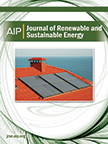
Journal of Renewable and Sustainable Energy
Scope & Guideline
Shaping Sustainable Futures Through Research
Introduction
Aims and Scopes
- Renewable Energy Technologies:
The journal emphasizes research on various renewable energy technologies, such as solar, wind, hydro, and biomass. It covers advancements in photovoltaic systems, wind turbine designs, and bioenergy production methods. - Energy Management and Optimization:
Research on optimizing energy systems for efficiency and sustainability is a core area. This includes studies on energy dispatching, load forecasting, and the integration of renewable energy sources into existing grids. - Environmental Impact and Sustainability:
The journal publishes studies that assess the environmental impacts of renewable energy projects, including life cycle assessments, emissions analysis, and sustainability metrics. - Innovative Modeling and Simulation Techniques:
A significant focus is placed on the development and application of modeling and simulation techniques for predicting energy production, system performance, and environmental impacts. - Policy and Economic Analysis:
The journal addresses the economic and policy dimensions of renewable energy, including market mechanisms, incentive structures, and the economic viability of renewable technologies.
Trending and Emerging
- Artificial Intelligence and Machine Learning Applications:
The integration of AI and machine learning techniques in energy forecasting, optimization, and system management is rapidly gaining traction, demonstrating their potential to enhance efficiency and reliability. - Energy Transition Strategies:
Research exploring pathways for transitioning to renewable energy systems, including decarbonization strategies and energy system transformations, is increasingly prominent. - Hybrid Renewable Energy Systems:
There is a growing focus on hybrid systems that combine multiple renewable sources, such as solar-wind or solar-biomass, to enhance energy reliability and efficiency. - Climate Change Impacts on Energy Systems:
Studies assessing the impacts of climate change on energy generation and consumption patterns are emerging, highlighting the need for adaptive strategies in energy planning. - Blockchain and Peer-to-Peer Energy Trading:
The exploration of blockchain technology for facilitating peer-to-peer energy trading and decentralized energy systems is becoming a hot topic, reflecting the shift towards more collaborative energy models.
Declining or Waning
- Traditional Biomass Utilization:
Research on conventional biomass energy utilization methods appears to be declining as the focus shifts towards more advanced bioenergy technologies and waste-to-energy processes. - Nuclear-Renewable Integration:
While initially a topic of interest, studies on the integration of nuclear power with renewable energy systems have decreased, possibly due to the growing emphasis on purely renewable solutions. - Geothermal Energy Systems:
Research on geothermal energy systems has waned, likely overshadowed by the rapid advancements in solar and wind technologies that are more widely applicable and commercially viable. - Conventional Energy Storage Solutions:
There is a noticeable decrease in studies focusing on traditional energy storage solutions (like pumped hydro), as newer technologies such as battery storage and hybrid systems gain more attention. - Historical Policy Analysis:
The trend of publishing historical analyses of renewable energy policies has diminished, with a shift towards current and future-oriented policy frameworks and their implications.
Similar Journals

Problemele Energeticii Regionale
Connecting Research and Innovation in Regional Energy IssuesProblemele Energeticii Regionale is a notable academic journal focused on the field of energy engineering and sustainable energy solutions, published by the Institute of Power Engineering, Academy of Sciences of Moldova. Since its inception in 2005, this Open Access journal has become a significant platform for disseminating research and innovations in various energy-related domains, including renewable solutions, fuel technology, and energy sustainability. While its impact factor metrics suggest it currently resides in the Q4 quartile category across multiple scopes—such as Energy Engineering, Power Technology, and Renewable Energy—it provides critical insights that can pave the way for advancements in regional energy challenges. Researchers, professionals, and students alike will find this journal an essential resource for understanding and contributing to the ongoing discourse in the energy sector. With its commitment to accessibility and knowledge sharing, Problemele Energeticii Regionale aims to foster a collaborative and informed community focused on energy innovation and sustainability.
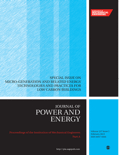
PROCEEDINGS OF THE INSTITUTION OF MECHANICAL ENGINEERS PART A-JOURNAL OF POWER AND ENERGY
Exploring the Frontiers of Mechanical EngineeringPROCEEDINGS OF THE INSTITUTION OF MECHANICAL ENGINEERS PART A-JOURNAL OF POWER AND ENERGY, published by SAGE PUBLICATIONS LTD, is a pivotal journal dedicated to advancing the fields of mechanical engineering and energy technology. With a history spanning from 1983 to 2024, this journal provides a respected platform for researchers and practitioners to disseminate findings that address contemporary challenges in power generation, energy efficiency, and sustainable engineering practices. As evidenced by its quarter ranking in Q3 within the categories of Energy Engineering and Power Technology, and Mechanical Engineering, it serves as a significant resource for academics aiming to enhance their understanding and explore innovation in these critical areas. While currently not an open-access journal, the research published here is invaluable for both ongoing education and professional practice, making it an essential read for anyone engaged in the engineering disciplines.

Advances in Energy Research
Connecting Ideas and Innovations in Energy Sustainability.Advances in Energy Research is a prominent journal dedicated to the exploration and advancement of energy technologies and sustainable practices. Published by TECHNO-PRESS, this journal serves as a vital platform for researchers, professionals, and students in the energy field, featuring innovative studies and reviews that contribute to the body of knowledge surrounding energy efficiency, renewable resources, and the integration of new technologies. The journal holds a significant position in energy research and aims to facilitate the dissemination of groundbreaking findings and ideas that are pivotal for the transition toward a more sustainable energy future. Located in South Korea, with an ISSN of 2287-6316, it embraces an open access philosophy that ensures widespread availability of its content, further enhancing its impact in the academic community.
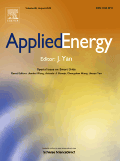
APPLIED ENERGY
Pioneering advancements in energy management and sustainability.APPLIED ENERGY, published by Elsevier Science Ltd, is a leading journal dedicated to the advancing field of energy research, focusing on practical engineering solutions to contemporary challenges in energy management, sustainability, and environmental impact. With a rigorous peer-review process and a strong commitment to promoting innovative research, APPLIED ENERGY proudly holds multiple Q1 rankings across various categories, including Building and Construction, Civil and Structural Engineering, and Renewable Energy, reflecting its prestigious position within the academic community. Researchers and professionals can benefit from its comprehensive scope, covering topics that span from policy and technology to market dynamics. Although it is not an open-access journal, it provides access options that facilitate research dissemination. With its historical significance since 1975 and an ambitious outlook up to 2025, APPLIED ENERGY continues to be an essential resource for anyone looking to stay at the forefront of energy research and application.

Frontiers in Energy
Advancing Knowledge in Energy Systems for a Sustainable World.Frontiers in Energy is a distinguished journal published by HIGHER EDUCATION PRESS, focusing on the dynamic and rapidly evolving field of energy engineering and power technology. Established in 2011, the journal serves as a pivotal platform for disseminating innovative research findings and practical applications that address critical challenges in energy systems. With an impressive Q2 ranking in 2023 and a Scopus rank of 81 out of 272 in the discipline, it highlights the journal's influential impact within the academic community, reflecting its commitment to high-quality research. Based in Beijing, China, the journal aims to promote open and accessible scientific discussion, facilitating collaboration among researchers, professionals, and students alike. As an open access publication, Frontiers in Energy ensures that valuable knowledge is readily available to a global audience, effectively contributing to advancements in sustainable energy solutions. Join the forefront of energy innovation by engaging with cutting-edge research that shapes our energy future.
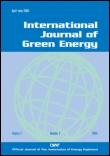
International Journal of Green Energy
Empowering knowledge for a sustainable tomorrow.The International Journal of Green Energy is a premier publication that plays a pivotal role in the field of renewable energy and sustainability. Published by Taylor & Francis Inc, this journal, with ISSN 1543-5075 and E-ISSN 1543-5083, has established itself as a crucial platform for sharing innovative research and developments from 2005 to 2024. With a commendable Q2 ranking in the category of Renewable Energy, Sustainability and the Environment, it ranks 100 out of 270 in Scopus, positioning itself in the 63rd percentile of its field. The journal is dedicated to advancing knowledge and fostering dialogue around green technologies and sustainable practices, providing invaluable insights for researchers, industry professionals, and students alike. Although it does not offer open access options, the journal's commitment to rigorous peer review ensures that only high-quality research is published, making it an essential resource for those seeking to explore and understand the complexities of green energy solutions.

AIMS Energy
Bridging Ideas and Innovations in Energy ScienceAIMS Energy is a leading academic journal published by the American Institute of Mathematical Sciences (AIMS), dedicated to advancing the field of energy research. With a strong commitment to Open Access since its inception in 2013, this journal offers a platform for researchers, professionals, and students to share innovative findings and enrich the discourse in crucial areas such as Energy Engineering and Power Technology, Fuel Technology, and Renewable Energy, Sustainability and the Environment. Recognized for its quality, AIMS Energy holds a respectable impact with a Q3 ranking in multiple categories as of 2023, and it ranks within the top half of its peers in the Scopus database. The journal's objective is to disseminate high-quality research that addresses contemporary challenges in energy and offers sustainable solutions. By fostering collaboration and discussion among various stakeholders, AIMS Energy plays a critical role in shaping the future of energy technologies and policies.
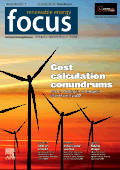
Renewable Energy Focus
Pioneering the Shift to Clean Energy AlternativesRenewable Energy Focus is a premier journal published by Elsevier, dedicated to advancing the field of renewable energy and sustainability. With an ISSN of 1755-0084 and an E-ISSN of 1878-0229, this journal serves as a vital platform for researchers, professionals, and students interested in innovative solutions to energy challenges. Established in 2007, the journal has evolved to become a recognized authority in the subject area, currently ranked in the Q2 quartile of its category for 2023, emphasizing its significance in promoting impactful research. The journal encompasses a wide range of topics, including solar, wind, bioenergy, and sustainable practices that contribute to environmental conservation and energy efficiency. As part of Elsevier's commitment to disseminating high-quality research, Renewable Energy Focus is indexed in Scopus, currently holding a rank of #92/270 in the energy sector, positioning it in the 66th percentile of its field. This journal offers an essential resource for those dedicated to fostering sustainable energy solutions.

Progress in Energy
Catalyzing Change in Energy Efficiency and SustainabilityProgress in Energy, published by IOP Publishing Ltd, is an esteemed open-access journal that focuses on cutting-edge research in the field of energy. With its e-ISSN 2516-1083, this journal stands out for its commitment to disseminating high-quality articles that aim to advance the understanding and application of energy technologies and policies. Juggling respectably in the academic arena, it proudly holds a Q1 classification in the energy (miscellaneous) category and ranks 6th out of 73 in the general energy sector, placing it in the top 92nd percentile among its peers, according to Scopus metrics. The journal's scope encompasses a wide range of topics, including renewable energy, energy efficiency, and policy analysis, making it a vital resource for researchers, industry professionals, and students alike. With a publication horizon extending from 2019 to 2024, Progress in Energy invites contributions that push the boundaries of knowledge in energy fundamentals and innovations.
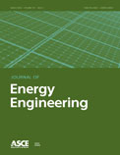
JOURNAL OF ENERGY ENGINEERING
Driving Research in Energy Systems and SustainabilityJOURNAL OF ENERGY ENGINEERING, published by the ASCE-Amer Soc Civil Engineers, serves as a pivotal resource in the fields of civil and structural engineering, energy engineering, and nuclear energy research. With an ISSN of 0733-9402 and an E-ISSN of 1943-7897, this esteemed journal demonstrates a consistent commitment to advancing knowledge in energy systems, sustainability, and waste management. Ranking within the second quartile in several categories—including Civil and Structural Engineering and Energy Engineering and Power Technology—this journal maintains a strong reputation, underscored by its Scopus rankings that place it in the top tiers of its discipline. Accessible from 1982 through 2024, the journal provides researchers and professionals meaningful insights through rigorously peer-reviewed articles, critical reviews, and case studies that address contemporary challenges in energy utilization and infrastructure development. Without open access options, it ensures the integrity and credibility of published work, showcasing influential research that contributes to sustainable solutions in energy and environmental frameworks. Researchers, professionals, and students alike will find the JOURNAL OF ENERGY ENGINEERING an indispensable platform for exploration and dissemination of innovative ideas within the realm of energy and engineering.